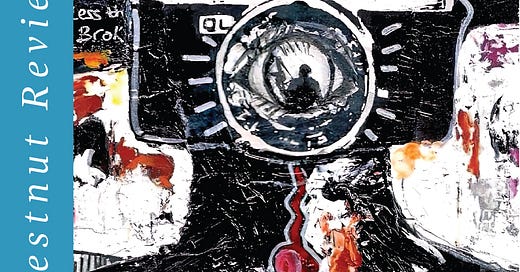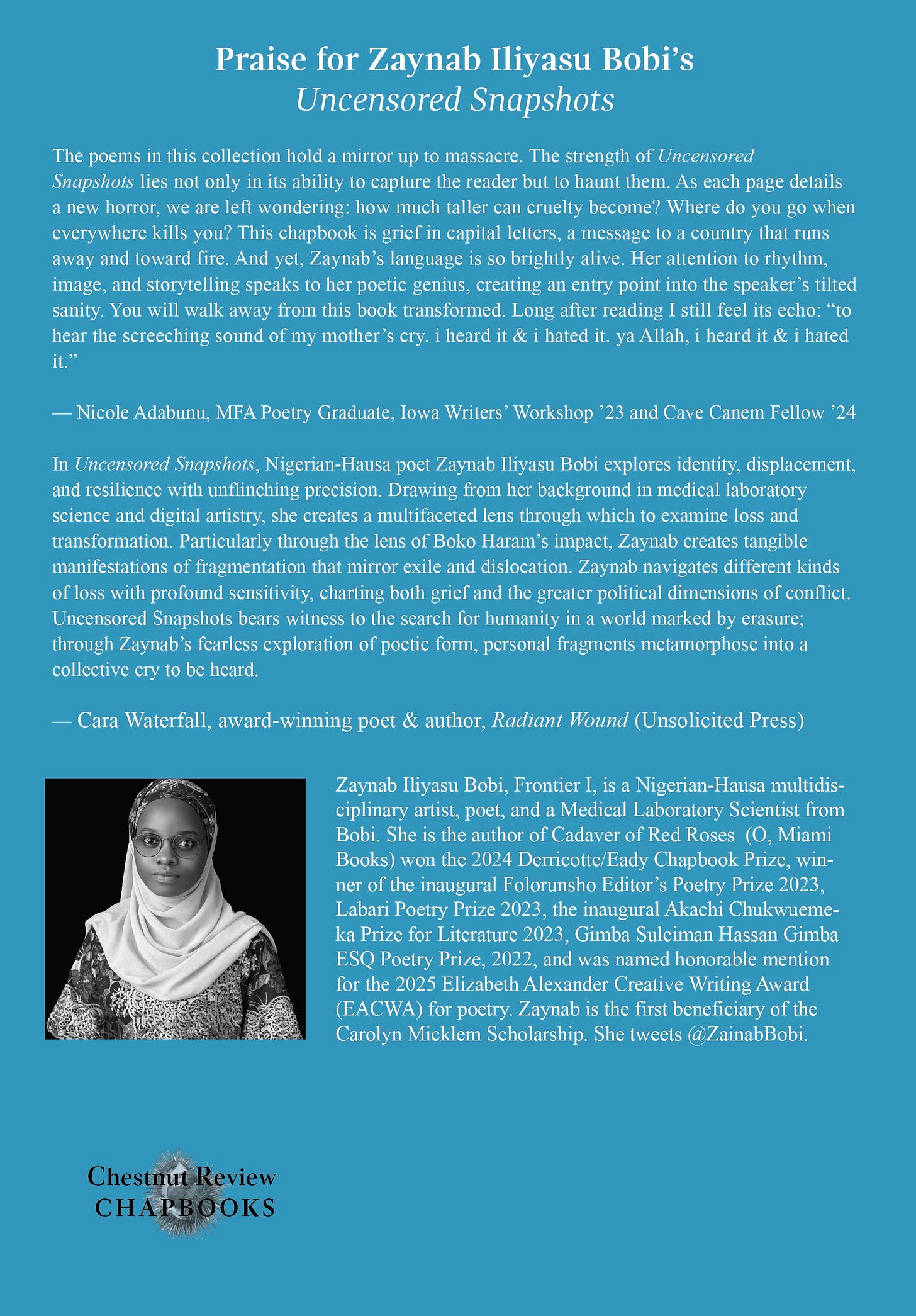Archipel Alumni #1: Unveiling Zaynab Iliyasu Bobi's Chapbook "Uncensored Snapshots"
A curated series of dispatches tracking the creative trajectories & latest work from my featured poets, writers & other creatives.
Welcome to Archipel, an ongoing dialogue between me (Cara Waterfall) and other poets and creatives of all kinds, celebrating the ways we connect through mentorship, community and transitions.If you are interested in participating, please send me an email by replying to this newsletter or click here.
Archipel was also inspired by my very first poetry mentor, my Dad. When you purchase a subscription to this newsletter, you are paying into a scholarship fund in his name, which will support emerging poets. To learn more about The Donald E. Waterfall Scholarship Fund, click here.
📢 Applications are now open for the Donald E. Waterfall Scholarship Fund!
✍️ 1-year poetry mentorship program 🌏 Open worldwide to poets 18+ 💫 Distinguished judges: @robmclennan & @salimaTM
Apply by June 1st (midnight UTC) here: https://bit.ly/4k2u7U5
Thank you for reading!
Unveiling a Powerful Voice: Zaynab Iliyasu Bobi's Uncensored Snapshots
It is my honour to unveil Zaynab Iliyasu Bobi's latest chapbook, Uncensored Snapshots (Chestnut Review Chapbooks, June 2025), a searing poetry collection that bears witness to the ongoing crisis in Northern Nigeria (also known as Arewa). Uncensored Snapshots — a title that references both the photographer's unfiltered lens and the poet's raw documentation — stands as more than a collection of poems. Through unflinching verse, Zaynab documents history as it’s unfolding, exposing ongoing atrocities and challenging systemic silence.
The cover was designed by the talented @art_lithiumf and brilliantly captures the collection's central tension: how does one document atrocity while being transformed by it? The camera-eye hybrid suggests that in conflict zones, there is no pure observation — to witness is to be marked by what you've seen. This visual metaphor perfectly aligns with Zaynab's poetic exploration of documentation and trauma.
Through lyrical and visceral poems, Zaynab skillfully documents the ethnic cleansing and rise of banditry in Arewa. These personal narratives explore the trauma of kidnapping and the daily uncertainty faced by communities under siege. In “martyr of daily bread”, she pays tribute to Ra’afat Al-issa, who was killed by Israeli soldiers as he traveled through a breach in the apartheid wall on his way to work:
Ra’afatرافت means pity in arabic. means compassion. means kindness.
translates to water’s softened hands. translates to the wind’s un-ruined teeth.
10th November, 2022 Ra’afat's name was stripped of meaning. Ra’afat’s body
was mapped with bullets. Ra’afat became the antonym of his name in a blood bag.
he became the seeker of his name; pity, kindness. Ra’afat was named martyr of daily bread.
i know now how names are given how the blood trails to where the feet last touched.
say the soldiers asked his name before they made a country of bullets in his body…
In the haunting lines of "road to freedom, Zaynab captures the constant anxiety of families waiting for news about loved ones. The poem reflects how every phone call brings dread, and how certain regions have become so dangerous they risk disappearing from memory if named. Through stark imagery and repetition, Zaynab’s poems paint a vivid picture of communities living in perpetual fear, where survival itself has become a daily obligation.
every news from the phone drains our blood to the nails.
after three rings, you will know death
lurks in the air. i don’t think the media can tell the road
to Mariga, Birnin Gwari, Ukuru, & a lot more.
i fear if i name them all, they will vanish.
...i think these days surviving
can pass for an obligation. all my people wanted was to exist
outside something less suffocating like the question mark
that continued to drag the bluebirds out of their bodies.
like the hands that hauled the drowned
from the large mouth of the Atlantic.
The collection gives voice to those displaced, as evidenced in the poignant lines in "finding my way home". In this powerful poem, the speaker redefines the meaning of home through the lens of forced migration, blurring the lines between the journey and the destination. The anaphora of "yes" throughout the poem creates a haunting rhythm that echoes the relentless search for belonging":
yes, i was home. yes, i was still on the road. yes, a road can be a home. yes, it
depends on how long you have walked.
Zaynab creates a complex examination of loss and transformation, illustrating how poetry can become a medium for processing personal and collective grief. In "escaping the home i called body", the speaker articulates a powerful metaphor for transformation and healing:
“i’m a heap of broken things. i love the endings of poems
because that is where i break open myself,
lay every piece in the lines & let them form strings of birds.”
Zaynab also finds what sustains in "everyone tends to care when you pass through the blade." Through vivid imagery and raw emotion, she shows how communities find strength even in the darkest of times. The final line — "the living also deserve roses" - is a powerful affirmation that hope and tenderness can persist even in the bleakest circumstances.
Beyond Documentation: The Vital Role of African Literary Voices
Zaynab’s work transcends mere documentation to serve as a crucial historical record and a means of building cross-cultural understanding. She reminds us that poetry can be both art and activism. By capturing intimate details of life under siege, from a mother's cry to a grandfather's kidnapping, she brings an immediacy and intimacy to tragedies that may seem distant. This kind of storytelling builds empathy and understanding across cultural and geographical boundaries, making it harder for readers to remain indifferent to human suffering.
Uncensored Snapshots highlights how contemporary African poets document their communities' struggles and resilience in ways that statistics and news reports cannot capture. While global media often overlooks regional conflicts, Zaynab's poems and other personal testimonies offer vital perspectives on how violence reshapes daily life — from family relationships to cultural identity — while showing how communities maintain their humanity. And as readers, we are forced to grapple with the uncomfortable realities about our role in allowing such situations to persist.
Uncensored Snapshots is available to order now at:
https://www.amazon.com/Uncensored-Snapshots-Chestnut-Review-Chapbooks/dp/1965158161
As always, thank you for reading.
With love and intention,
Cara





